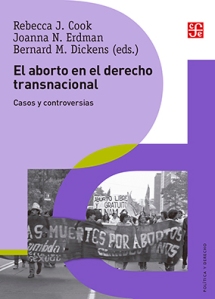Many thanks to Naitore Nyamu, an LL.M. student in the graduate program in Sexual and Reproductive Rights in Africa at the University of Pretoria’s Centre for Human Rights, for contributing a detailed abstract of this progressive Kenyan ruling for Legal Grounds III: Reproductive and Sexual Rights in Sub-Saharan African Courts, online edition.
J O O (also known as J M) v Attorney General & 6 others [2018] Petition No 5 of 2014, (High Court of Kenya at Bungoma), March 22, 2018. Case summary by Naitore Nyamu. Court decision.
The case summary by Naitore Nyamu explains how, on 5 August, 2013, a low-income pregnant woman sought healthcare for delayed labour and suffered neglect, privations and expenses from an ill-funded county hospital, and humiliating personal abuse from its nurses. She later filed a constitutional petition alleging various violations of her rights as stipulated in the Constitution of Kenya 2010 and she also made reference to rights recognized in international human rights treaties to which Kenya is a party.
The Court held that the Petitioner’s right to maternal health care had been infringed and that the abusive actions of the nurses and the Hospital denied, derogated and demeaned the Petitioner’s worth. Hence, the Court found a violation of her right to dignity contrary to the provisions of Article 28 and a violation of her freedom and security, including the right not to be treated in a cruel, inhuman and degrading manner, contrary to Article 29 (j) of the Constitution of Kenya 2010. Additionally, the Court held that the national and county governments had failed to devote adequate resources to healthcare services and had not established effective measures to implement, monitor and provide minimum acceptable standards of health care. This is a violation of the Constitution and the international instruments that Kenya has ratified.
As Naitore Nyamu comments in her case summary, the Kenyan Constitution of 2010 has an expansive Bill of Rights, including the right to sexual and reproductive health, but women in Kenya cannot access maternal care in a dignified manner. One of the tenets of devolving the health services was to increase accessibility of better health care services to all citizenry. The treatment the Petitioner received at the Hospital leaves a lot of questions on whether the County Governments want to make the right to health and sexual and reproductive health rights a reality. This case highlights how deep-rooted and systemic the violations of the rights to maternal health care are in Kenya. It also illustrates the many obstacles and humiliations that women seeking maternal health care can face in public health institutions.
This High Court judgment in J.O.O. reinforces the decision in Millicent Awuor Omuya alias Maimuna Awuor & Another v. The Attorney General & 4 Others (2015), (Petition No. 562 of 2012), where it was held that the National and County Governments do not require resources to accord respect to women seeking services in public institutions such as hospitals. The Court’s reliance on provisions of international legal instruments ensured that the Court interpreted this issue from a wide spectrum of human rights provisions, hence this is a very progressive ruling that sets high standards. The Court found that the actions and omissions of the respondents were in violation of numerous rights as provided in the international treaties that Kenya has ratified. This signifies that it is not enough to just ratify conventions; states must equally ensure realization of the rights in these conventions. It was also an indication that Kenya cannot ratify conventions and fail to effect what these provisions stipulate.
For details, see Naitore Nyamu’s full case summary, online here, or the High Court’s decision of March 22, 2018 online here.
An earlier Kenyan case of maternal abuse is abstracted in Legal Grounds III: Reproductive and Sexual Rights in Sub-Saharan African Courts:
- Millicent Awuor Omuya alias Maimuna Awuor & Another v The Attorney General & 4 Others [2015], Petition No. 562 of 2012, (High Court of Kenya at Nairobi (Constitutional and Human Rights Division)). [Detaining women for failing to pay for maternal health services is a violation of their constitutional rights] Decision online
Other decisions from this chapter are summarized in Legal Grounds III.
- The Center for Health Human Rights and Development (CEHURD) and 3 Others v Attorney General [2012], Constitutional Petition No. 16 of 2011 (Constitutional Court of Uganda at Kampala). Preventable maternal deaths dismissed as a “political question”. However, see subsequent Supreme Court decision of 2015] Decision online.
- The Center for Health, Human Rights and Development and 3 Others v Attorney General [2015], Constitutional Appeal No. 01 of 2013 (Supreme Court of Uganda at Kampala), Judgments by Kisaakye, JSC and Katureebe, CJ. [Ugandan Supreme Court orders Constitutional Court to hear a petition on maternal health rights violations.] Decision online.
- The Center for Health, Human Rights and Development & 4 Others v Nakaseke District Local Administration [2015], Civil Suit No. 111 of 2012 (High Court of Uganda at Kampala). [Ugandan High Court finds human rights violations where a pregnant woman died of a ruptured uterus and blood loss while in labour.] Decision online.
- Ntsele v Mec for Health, Gauteng Provincial Government [2012] ZAGPJHC 208 (South Gauteng High Court, South Africa) [medical negligence during labour] Decision online.
Maternal Health Care and Services – thematic highlight by Tinyade Kachika
Legal Grounds III: Reproductive and Sexual Rights in Sub-Saharan African Courts (Pretoria: Pretoria University Law Press, 2017) 54 court decisions from 2008-2016 Online edition with updates. Entire book, 228-pages
Legal Grounds I and II are online at the Center for Reproductive Rights.
__________________
Compiled by the Coordinator of the International Reproductive and Sexual Health Law Program, reprohealth*law at utoronto.ca For Program publications and resources, see our website, online here. TO JOIN THIS BLOG: enter your email address in upper right corner of this webpage, then check your email to confirm the subscription.




